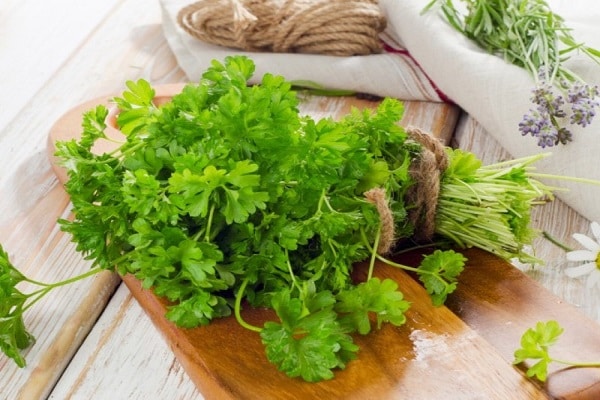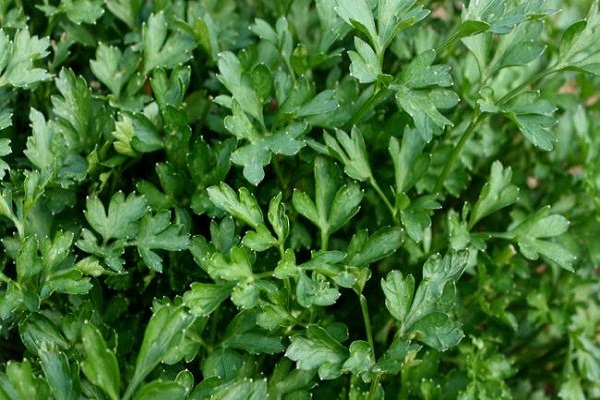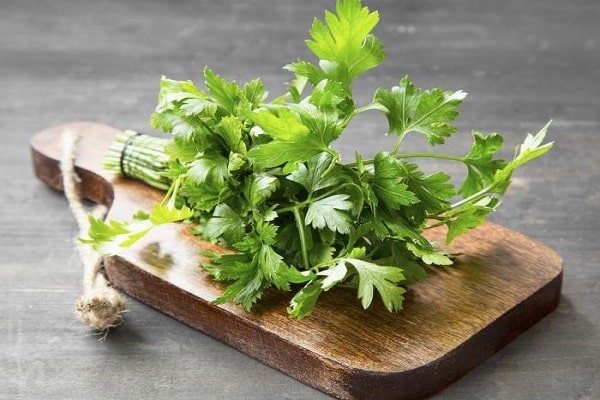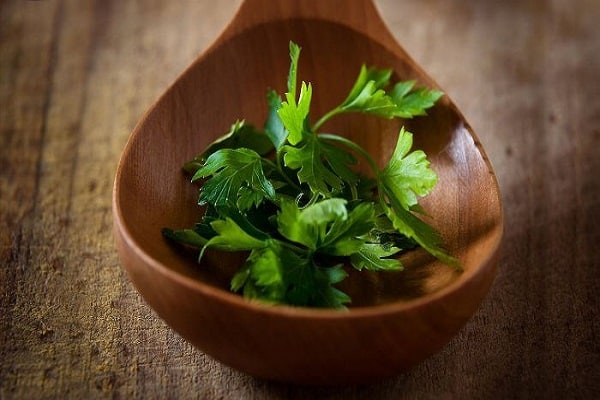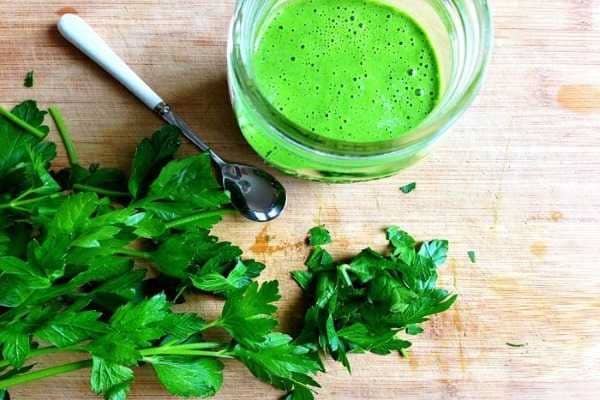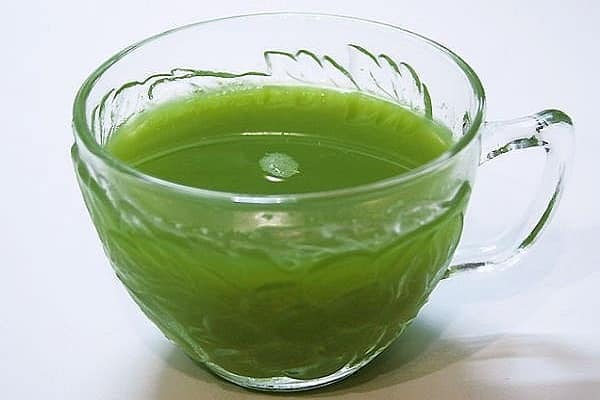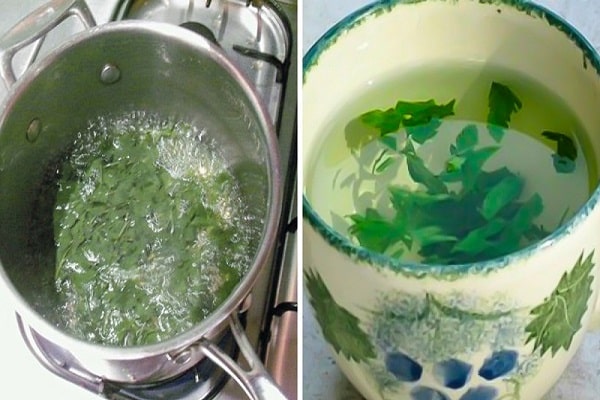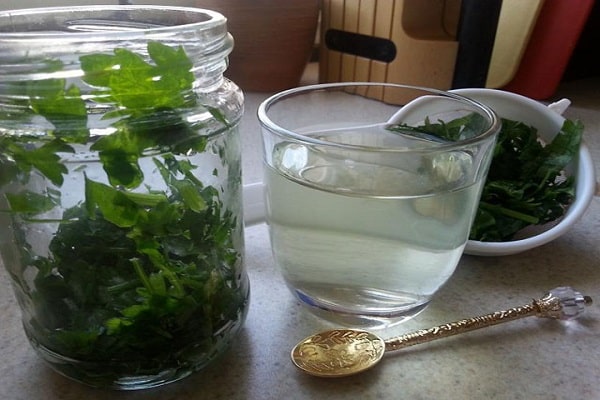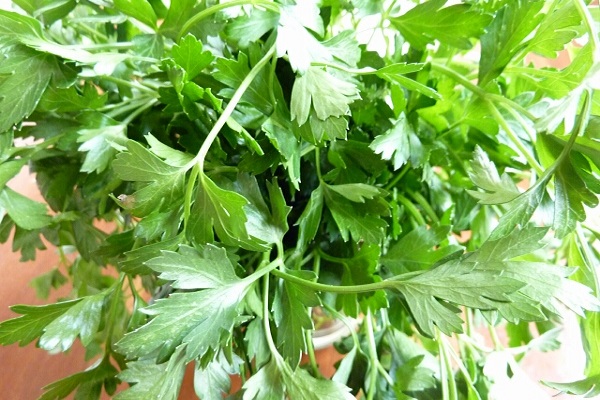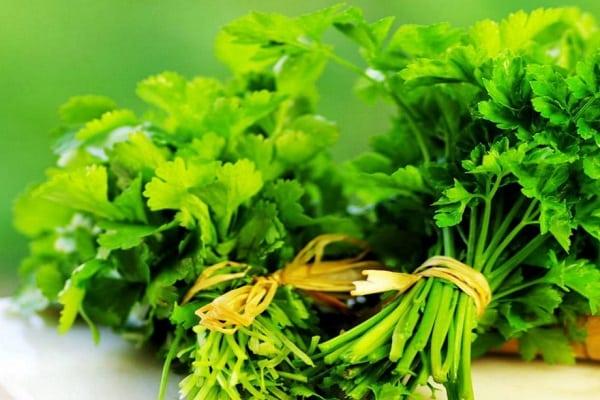Today there are quite a large number of varieties of parsley, and the benefits and harms of each of them for a pregnant woman are the same. The average calorie content of 100 g of plant is 49 kcal. The main value of the product lies in its rich composition:
- a large number of vitamins, including groups A and B, C, E, K;
- organic acids;
- alimentary fiber;
- monosaccharides and disaccharides;
- minerals, including potassium, calcium, magnesium, sodium, phosphorus, iron.
The plant contains a small amount of fat; the plant is a source of protein and carbohydrates. Several stems of the plant can provide the body with a daily requirement of vitamin C. Nutritionists say that parsley contains more of this substance than carrots and lemon. In terms of the amount of keratin, the grass is not inferior to carrot roots.
How does parsley affect pregnancy?
During pregnancy, a woman's body experiences serious stress. A lack of vitamins and minerals can negatively affect the well-being of the mother and fetus, and in exceptional cases cause a delay in the child’s development. Greens can be a good source of nutrients if the plant is used correctly for preventive and therapeutic purposes.
In the early stages
Thanks to a large amount of vitamins and minerals, parsley can strengthen the immune system and help protect the body from the influence of environmental factors. In the early stages, the formation of the fetus and its main vital systems occurs, so the mother’s ability to resist viruses and infections has a beneficial effect on the development of the embryo.
In the early stages of pregnancy, the use of parsley must be approached with caution; you should not try to eat greens in large quantities.
In the early stages, greens can be consumed in small quantities and mainly as a seasoning for dishes or as an ingredient for the preparation of cosmetics. This limitation is due to the herb's ability to cause miscarriage. In the past, women used this quality of the plant to terminate unwanted pregnancies.The plant is a muscle stimulant and can increase the tone of the uterus, which leads to the loss of a child.
In the later stages
Many women, when carrying a child, encounter problems with anemia, which can be successfully solved by eating parsley. A lack of oxygen threatens the baby with oxygen starvation, which leads to the appearance of pathologies and delayed development of the child. Due to the high iron content in the body, hemoglobin levels are restored and the woman’s well-being improves.
During pregnancy, many expectant mothers experience tooth decay, disruption of hair structure and hair loss, and diseases of the musculoskeletal system. When using parsley decoctions and infusions, the severity of this problem is reduced.
The problem with most pregnant women is swelling, including that of a renal and cardiac nature. Thanks to the diuretic effect of the plant, when using this herb, you can achieve better removal of excess fluid from the body. You should not overuse diuretic decoctions based on parsley, since beneficial substances are washed out of the body along with the liquid. Including greens in your diet helps you cope with problems with the digestive system, including bloating and gas.
Beneficial properties of parsley during pregnancy
The garden crop contains a large amount of antioxidants, which help increase the protective properties of the body of a pregnant woman. The use of parsley has the following effects:
- vitamin C improves the functioning of the immune system;
- folic acid contributes to the proper development of the fetus;
- iron prevents the development of anemia;
- phosphorus and minerals preserve the integrity of bones, teeth, and improve the appearance of hair;
- Vitamin K helps provide nutrition to the skeletal system.
Due to the rich composition of parsley, the inclusion of such a product in the diet promotes proper growth and development of the fetus. The plant helps to improve the well-being of the expectant mother and facilitate the process of bearing a child.
Decoction during pregnancy
The best option for obtaining raw materials for preparing decoctions is to grow herbs in your garden plot or in a container on the windowsill. It is recommended to take fresh green leaves without signs of defects as ingredients, which are thoroughly washed before use. When buying at the market, you should pay attention to the color and smell of the grass; good greens have a bright color and a rich aroma.
To prepare the decoction, take a medium bunch of greens and boil it in a small amount of water (200 ml). Use the product in the following ways:
- for oral administration;
- in the form of a solution for tampons that are applied to the eyes for conjunctivitis;
- as a mouthwash for gum problems;
- for the prevention and treatment of stomatitis, since the decoction has disinfectant properties.
In the summer, a parsley-based decoction can be used as an effective remedy for mosquito bites. To get results, just lubricate the affected area with a swab soaked in liquid.
Products with parsley have a good anti-aging and whitening effect, which makes it possible to use it as a facial cosmetic. The problem of skin pigmentation is familiar to many pregnant women, while the use of cosmetics is often impossible due to the presence of specific odors, which is especially acute during pregnancy due to constant attacks of nausea. The decoction is prepared as follows:
- take a few washed parsley stalks;
- the greens are placed in a container and filled with a glass of boiling water;
- the decoction is infused for 2 hours;
- the liquid is filtered and placed in an opaque container.
Wipe the skin with the prepared decoction in the morning or evening, using the product as a natural lotion. If desired, you can freeze the product in the form of small ice cubes and use them as needed as a safe remedy for improving skin condition.
Parsley root can be used to prepare decoctions. It is worth considering that the root vegetable has a greater effect compared to parsley leaves. Due to this feature, such decoctions must be used with extreme caution. Parsley roots are well stored in winter, so if there is a lack of vitamins, they can be a good substitute for fresh herbs.
Parsley infusion for expectant mothers
An infusion based on parsley helps relieve attacks of nausea, which are quite common during pregnancy. Typically, such manifestations are typical for the early stages of pregnancy, but can bother a woman throughout the entire period of bearing a child.
An infusion is prepared from parsley seeds:
- take 1 tsp. seeds;
- pour 2 cups of boiled water;
- leave for 8 hours;
- filter and pour into a container.
The infusion is taken orally, 1 tbsp. l. 30 minutes before meals.
Contraindications
A contraindication to the use of parsley and products based on it is considered to be personal intolerance to the herb. If the standards of use are observed, the plant is safe and can become a “helper” when bearing a child.Almost the only prohibition on the use of herbs to prevent problems in a pregnant woman is the presence of nephritis. Persons prone to allergic reactions should approach recipes containing parsley with caution.
Do not exceed the permissible limits and do not use parsley in large quantities. Thanks to its diuretic effect, the use of parsley decoctions helps remove fluid from the body, while useful substances are inevitably washed out. The danger lies in the potential threat of creating a deficiency of nutrients in the body. The bones of the musculoskeletal system are most susceptible.
The product contains myristicin, which in large doses can cause hallucinations, lead to loss of coordination, dizziness and cause convulsions.


